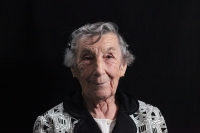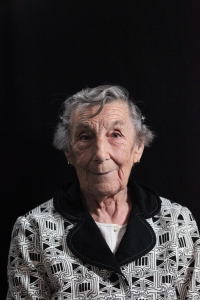We used to throw the flowers of the bird cherry and its white blossoms at the passing soldiers who liberated us

Stáhnout obrázek
Zdenka Uhříková was born on 2 July 1933 in Hošťálková in the Wallachia region, in a pastoral settlement still called Pod Vrchem. Her parents, Josef Uhřík and Jana, née Češková, supported the partisan movement during the Second World War - their father became a liaison delivering messages and ammunition, and in a bunker in the forest above the cottage, they took care of a wounded escaped Soviet prisoner of war. The family belonged to the local Evangelical community. They farmed about six hectares, but at the time of collectivisation, they refused to join a unified agricultural cooperative (JZD) and remained private farmers until 1969. Zdenka Uhříková graduated from a town school and a business school in Vsetín. She worked all her life in Hošťálková at the Sandrik national enterprise, where knives and cutlery were produced. At the time of filming in 2023, she lived in Hošťálková.

